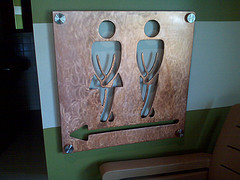Arizona Bill: The Sex Listed On Birth Certificate Designates Which Public Bathroom You Use
New legislation in Arizona is stirring up controversy over the rights of transgender people in that state, with debate over a bill that would require people to use the public restroom affiliated with their birth gender. The proposed law would also make it a misdemeanor for a person to use a public shower, bath, dressing room or locker room associated with a gender other than what’s on his or her birth certificate.
Under Republican Rep. John Kavanagh’s proposed law, penalties for using a public bathroom designated for a sex other than the one on your birth certificate could include the possibility of six months in jail.
According to the Associated Press, he says he was outraged by efforts in Phoenix to increase protections for transgender people — that city recently passed a human rights ordinance prohibiting gender identity discrimination at public accommodations. Kavanagh is worried that such anti-discrimination bans would cover pedophiles who want to expose themselves to kids.
Kavanagh says the government shouldn’t let people use public facilities based on “you are what you think you are.”
“This law simply restores the law of society: Men are men and women are women,” he said. “For a handful of people to make everyone else uncomfortable just makes no sense.”
It’s not always easy for transgender people to change the sex listed on their birth certificate. In some states, like Ohio and Idaho, it’s impossible, notes the American Civil Liberties Union. As such, opponents of the bill see the situation as a no-brainer.
“If you look like a man and you live your life like a man, you should be able to use a man’s bathroom,” said a transgender rights attorney for Lambda Legal, a national gay advocacy group based in New York. “It’s just common sense.”
The executive director for the Transgender Law Center in San Francisco points out that businesses are usually more active in recognizing equal access rights for transgender people than governments, perhaps just to avoid being sued.
“No one should have to live in a world where they have to show their papers to pee,” he said.
Equal access varies by state — it’s illegal to discriminate against transgender people in at least 16 states — and those protections aren’t all the same. Some laws prohibit discrimination in employment, housing, education and public accommodations, while others seem to pick and choose.
Want more consumer news? Visit our parent organization, Consumer Reports, for the latest on scams, recalls, and other consumer issues.


